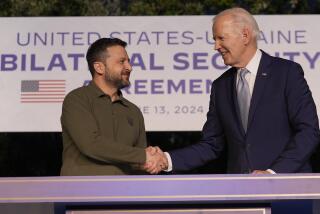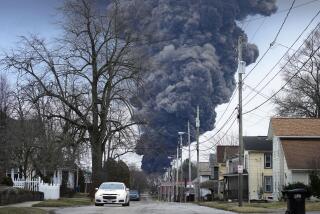Chemical Arms Pact Called Near : U.S., Soviets Reportedly Ready to OK Disclosure of Weapons Data
WASHINGTON — The United States and the Soviet Union, attempting to prepare the way for a global ban on chemical warfare, are on the brink of an agreement to disclose and verify their chemical weapons capabilities, Bush Administration sources said Tuesday.
Barring last-minute obstacles, Secretary of State James A. Baker III and Soviet Foreign Minister Eduard A. Shevardnadze are expected to announce an accord on the two key provisions at their meeting in Wyoming next week.
A draft of the agreement calls for the superpowers to disclose the quantities, types and locations of chemical weapons stockpiles maintained by each nation and to allow a trial run of short-notice, on-site inspections before a formal treaty is concluded.
The “memorandum of understanding” would be “the biggest breakthrough in bilateral negotiations on chemical warfare in three years,” according to a leading U.S. analyst.
Additional Impetus
Administration officials hope that the agreement will provide additional impetus for a broad multinational treaty covering production of the controversial and deadly weapons, particularly by Third World nations now expanding or developing new chemical warfare capabilities.
“This is a major step toward a treaty that many people have claimed the Soviet Union will violate,” said one State Department official. “We are going to address that concern by trying to find out if we can verify--before signing anything. This should help alleviate that concern.”
The issue of verification of production capability and stored weapons is far more complicated than with other disarmament agreements because chemical weapons, unlike large missiles or nuclear weapons, are easily hidden or transferred to new sites.
Disclosing secret data on the size and location of stockpiles also has been controversial because Pentagon analysts have challenged claims by the Soviets that they have only 50,000 tons of various chemical agents in storage.
Disclosure is considered vital to building an atmosphere of trust between the superpowers, a relationship that could serve as a model for other nations wary of revealing their capabilities.
The United States also plans to accelerate movement on a global ban by introducing two initiatives next week at an international conference in Australia that Baker personally asked Canberra to organize and host. More than 70 nations--including Iraq, Syria and Iran, three nations believed to have sophisticated chemical warfare capabilities--are expected to attend.
The first initiative, which will be presented by Assistant Secretary of State Richard Clarke, will propose taking pre-verification steps before a global treaty is signed. Those steps include compiling data bases on worldwide stockpiles and information on technical capabilities of countries believed to have chemical weapons.
At least 20 countries now are thought to have the deadly toxins or to be close to developing them, according to the CIA. Only two countries--the United States and the Soviet Union--have acknowledged possessing chemical weapons, although Iraq’s use of chemical weapons in the eight-year Persian Gulf War was repeatedly confirmed by U.N teams.
Clarke also will propose a framework for a multinational “technical secretariat” to carry out the pre-verification steps. The secretariat may serve as a preliminary model for a formal body to monitor production and proliferation, if a global ban is signed.
The U.S. Chemical Manufacturers Assn. is expected to propose a second initiative on self-policing by the world’s major producers of the precursor substances needed to make chemical weapons.
The five-point package is designed to encourage exchange of information about the sale of chemical precursors, most of which are purchased for legitimate agricultural and industrial use.
West German Sales
The problem of manufacturers operating independently of government policies was illustrated by the sale of precursors and technical equipment by private firms in West Germany to Libya for its new chemical warfare plant at Rabta. West Germany has since tightened export controls.
While other European countries and Japan have improved monitoring of private industry sales of precursors, Third World nations are increasingly providing new sources of the raw materials needed to make chemical weapons, according to U.S. officials.
Both the U.S.-Soviet talks and the Canberra conference underscore the contrast between chemical weapons talks and other disarmament treaties. The biggest obstacles are no longer between Washington and Moscow, but between the superpowers and the Third World.
The burgeoning new chemical industry in countries such as Brazil, Venezuela, Argentina, Colombia and India and the desire by smaller nations to develop the “poor man’s nuclear weapon” have complicated efforts by the superpowers to negotiate a treaty.
“The problem is increasingly not with Europe or Japan, but with new industries in the Third World,” said Kyle Olson of the Chemical Manufacturers Assn. “They have identified the need for indigenous chemical industries for their own economic well-being.”
But many Third World countries either have lax export controls on chemicals or do not view chemical weapons as a major problem.
“Many of these countries get very nervous when the superpowers and the Europeans begin talking about restrictions on producing certain chemicals,” Olson said. “They see it as an attempt to freeze them out of a state-of-the-art industry they need for basic development.”
The Canberra conference was designed in part to increase pressure on both governments and chemical manufacturers in smaller nations to cooperate, U.S. officials said.
More to Read
Sign up for Essential California
The most important California stories and recommendations in your inbox every morning.
You may occasionally receive promotional content from the Los Angeles Times.










